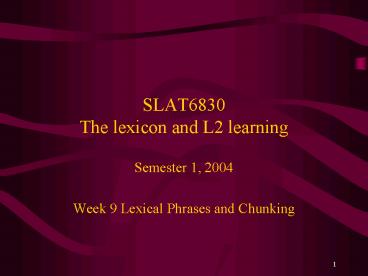SLAT6830 The lexicon and L2 learning - PowerPoint PPT Presentation
1 / 16
Title:
SLAT6830 The lexicon and L2 learning
Description:
Part of the memorized sentences and lexicalised sentence stems ... closing -- parting. question answer. advanced. nominating a topic checking comprehension ... – PowerPoint PPT presentation
Number of Views:47
Avg rating:3.0/5.0
Title: SLAT6830 The lexicon and L2 learning
1
SLAT6830 The lexicon and L2 learning
- Semester 1, 2004
- Week 9 Lexical Phrases and Chunking
2
Lexical phrases
- multi-word lexical phenomena that exist
somewhere between the traditional poles of
lexicon and syntax - Nattinger DeCarrico, 1992, p1
- Part of the memorized sentences and lexicalised
sentence stems that are needed for native-like
control of the language (Pawley Syder, 1983,
cited in Ellis, 1994)
3
Lexical phrases
- Part of the memorized sentences and
lexicalised sentence stems, possibly numbering
the thousands, that are needed for native-like
control of the language (Pawley Syder, 1983) - Examples Can I come in? Whats for dinner?
and Speak for yourself. - (From Ellis, 1994, 84-85)
4
Categories of lexical phrases
- Polywords. Short phrases which function as
individual lexical items by the way, you know - Institutionalised expressions. Sentence length
invariable phrases, usually function as separate
items How do you do? Give me a break. - Phrasal constraints. Slot filler phrases. A___
ago, see you___ - Sentence builders. Lexical phrases that provide
the framework for whole sentences. I think that
___, Modal you VP (for me)?
I
5
Sentence builders
- NP be-tense sorry to keep-tense you waiting
- gt Fully specified structure along with a nucleus
of lexical and grammatical morphemes, realized as
(a.k.a stacking) - Im sorry to keep you waiting.
- Im sorry to have kept you waiting.
- Mr X was sorry to keep you waiting the other day.
- Etc.
6
The role of formulaic expressions in SLA
- Reflect ritualised nature of much communication
- Embody societal knowledge
- Facilitate production
- Provide way to bootstrap L2 grammatical knowledge
7
Are lexical phrases like vocabulary items?
- How are lexical phrases represented in the mental
lexicon?
8
Advantages of teaching lexical phrases in
conversations
- Allow learners to express ideas as rote forms
- Highly contextualized so easier to remember
- Facilitate interaction
- A source of entry into the grammatical system
9
Lexical phrase approach to teaching conversation
- Beginning lesson.
- Present a single predictable situation centred on
a common communicative function and offer a few
simple but variable phrases for dealing with that
situation - Later.
- Introduce more complex phrases that express the
same function.
10
Teaching lexical phrases through exchange
structures
- Exchange structures expected sets of successive
utterances in a conversation - standard
- summons -- response
- nominating a topic -- clarifying (by audience)
- closing -- parting
- question answer
- advanced
- nominating a topic checking comprehension
- asserting accepting
- asserting endorsing
- asserting disagreeing Nattinger DeCarrico
1992, p119-121)
11
Indirect speech acts
- Direct speech acts form-function meaning
derived directly from the surface form, - Shut the door.
- Indirect speech acts form-function meaning not
directly derivable from the surface form, - Can you shut the door?
- Would you mind shutting the door?
- Would it be too much trouble to ask you to shut
the door?
12
Teaching indirect speech acts
- Can be extremely difficult for L2 learners
- Important to teach lexical and contextual
variations. - Nattinger DeCarrico, 1992, pp 128-129
13
Lexical phrases in academic listening
- The importance of discourse organization markers.
- Global organization markers
- Topic markers, First of all
- Topic shifters, So, lets turn to
- Summarizers, To sum up
14
Lexical phrases in academic listening
- Local organization markers
- Exemplifiers, For example
- Relators, Along the same lines
- Evaluators, The important thing is
- Qualifiers, It depends on how you define X..
- Aside markers, Where was I?
- The use of a particular marker depends on the
lecture style
15
Lexical phrases in academic listening
- The use of a particular marker depends on the
lecture style. - Conversational informal speaking and
interaction with students - Rhetorical Lecturer as performer
- Reading Lecturer reads from prepared notes
- Style switching within a lecture is common
16
- End of slides Week 9 SLAT6830































